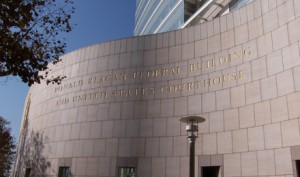SANTA ANA, CALIF.
 After finding the Mongols outlaw motorcycle gang guilty of racketeering offenses last month, a federal jury Friday determined that the criminal organization should forfeit the logos worn by members, according to authorities.
After finding the Mongols outlaw motorcycle gang guilty of racketeering offenses last month, a federal jury Friday determined that the criminal organization should forfeit the logos worn by members, according to authorities.
The jury finding that there was a direct connection between the gang’s crimes and the trademarked logos that prosecutors said formed the core of the motorcycle gang’s identity.
The forfeiture verdict culminates a decade-long prosecution of the Mongol Nation criminal enterprise and 77 members who were previously found guilty of racketeering offenses.
Today’s verdict – which will result in the forfeiture of the Mongol’s legal interests in the word “Mongols,” the gang’s center patch that depicts a goateed motorcycle rider, and combination of the two patches often seen on the Mongols’ leather vests – is the first of its kind in the nation.
The verdict also ordered the forfeiture of scores of items bearing the Mongols name and logo that were seized during a lengthy investigation into the gang. During closing arguments earlier this week, prosecutors said members of the Mongols were “empowered by these symbols that they wear like armor.”
Pursuant to federal criminal forfeiture law, the verdict requires the entry of a “preliminary order of forfeiture” as part of the sentencing on the Mongols’ RICO convictions, according to documents filed by prosecutors. With further litigation expected on the forfeiture of the name and logo, prosecutors at this time have not asked the court for an order that would permit authorities to seize additional items bearing the name and logo from individual members of the gang.
“The Mongols are a notorious criminal organization whose members regularly engage in violent acts against law enforcement officers, rival gangs and members of the public,” said United States Attorney Nick Hanna. “The verdicts in this case brand the Mongols as a racketeering enterprise and direct the forfeiture of property used by the gang for decades to encourage and reward numerous acts of murder, assault and drug trafficking.”
Adding, “The prosecution of an organization built around crime realizes one of the most important goals of the RICO Act – the eradication of organized crime by providing enhanced sanctions, including forfeiture, that attack the sources of a criminal enterprise’s economic power and influence.”
“ATF spent decades infiltrating and working to shut down this criminal organization which engages in heinous violent acts,” said Bill McMullan, Special Agent in Charge of the Bureau of Alcohol, Tobacco, Firearms and Explosives, Los Angeles Field Division. “We are proud our work resulted in their unity symbol, the Mongol patch, being forfeited.”
At the conclusion of the guilt phase of the gang’s trial on December 13, the jury convicted the Mongol Nation of violating the Racketeer Influenced and Corrupt Organizations (RICO) Act, as well as conspiring to violate the RICO Act. In rendering its verdict on the substantive RICO count, the jury specifically found that the Mongols constituted a criminal enterprise that was responsible for a murder, an attempted murder, a narcotics-trafficking conspiracy and two methamphetamine transactions. The RICO conspiracy charge included not only the five substantive racketeering acts, but five additional homicides, nine assaults and a series of narcotics transactions, one of which involved the seizure of more than 13 kilograms of cocaine.
In court last month, a federal prosecutor called the organization “a beehive of pernicious criminal activity.”
The case against the gang was filed in 2013, following a 2008 indictment of individual Mongols members – 77 of whom pleaded guilty to violating the RICO statute. The two criminal cases were before a total of four federal judges and were the subject of extensive litigation, including a separate civil lawsuit filed by an uncharged Mongols member.
The cases were the result of an investigation – Operation Black Rain – led by the Bureau of Alcohol, Tobacco, Firearms and Explosives in which four male ATF agents worked undercover and successfully infiltrated the Mongols to become full-patch members.
Four female ATF agents also went undercover to pose as their girlfriends. The undercover agents developed and maintained biker personas, and they had to undergo rigorous scrutiny by the Mongols to be accepted as members. When one of the ATF agents received his patch, one of the gang’s members said: “Being a Mongol promises you one of two things – death or prison.”
United States District Judge David O. Carter, who oversaw the trial of the RICO case against the Mongols gang, will schedule a hearing to impose the sentence on the organization. In addition to the forfeiture, the Mongols may be subject to monetary fines.

